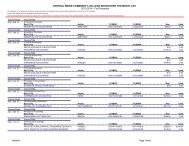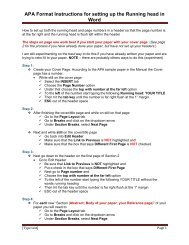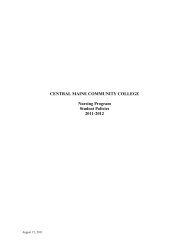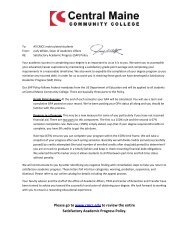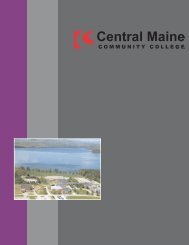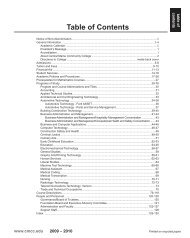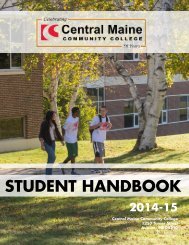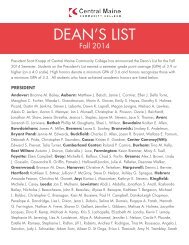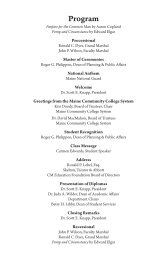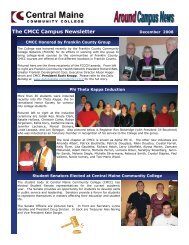Academic Policies and Procedures - Central Maine Community ...
Academic Policies and Procedures - Central Maine Community ...
Academic Policies and Procedures - Central Maine Community ...
You also want an ePaper? Increase the reach of your titles
YUMPU automatically turns print PDFs into web optimized ePapers that Google loves.
course<br />
descriptions<br />
Course Descriptions<br />
During the course the students will be required<br />
to interact with K-12 school per sonnel <strong>and</strong> other<br />
education stakeholders in an interview format.<br />
They will then use cur rent educational literature<br />
available in libraries to do research on selected<br />
issues brought up during their interviews. This<br />
course also requires each student to devel op a<br />
portfolio demonstrating that he/she is fully aware<br />
of professional issues <strong>and</strong> responsibilities.<br />
Electromechanical<br />
Technology (ELT)<br />
ELT 102 Electric Motors<br />
2 Credits (1 Lecture 1 Lab 0 Shop)<br />
3 Hrs/Wk (1 Hr. Lecture 2 Hrs. Lab) *15 wks<br />
This course is a study of electric motor theory<br />
<strong>and</strong> operation. Electromechanical principles of<br />
motor operation are examined in detail. Singlephase<br />
AC Motor types include the Shaded-Pole,<br />
Split-Phase, <strong>and</strong> Capacitor-Start motor. Three-<br />
Phase motors applications. Motors are selected<br />
for spe cifi c applications <strong>and</strong> motor protection is<br />
selected following NEC regulations. Emphasis<br />
is placed on trouble shooting, on-sight preventative<br />
maintenance, testing, repair, <strong>and</strong> replacement<br />
of electric motors. Prerequisite: ELT 111.<br />
ELT 103 Residential Controls<br />
2 Credits (1 Lecture 1 Lab 0 Shop)<br />
3 Hrs/Wk (1 Hr. Lecture 2 Hrs. Lab) *15 wks<br />
This course is a study of the functioning of electrical<br />
devices that are primarily used for manual<br />
switching of circuits such as piloted single-pole<br />
switches, Eagle three-way switches, <strong>and</strong> fourway<br />
switches. Empha sis is placed on methods of<br />
wiring these devices into a wiring system following<br />
NEC procedures <strong>and</strong> interpreting blueprints <strong>and</strong><br />
schematics. Applications include selecting proper<br />
size <strong>and</strong> type of electrical devices <strong>and</strong> cables for<br />
a particular application. Students will convert<br />
electrical plans into physical installations.<br />
ELT 104 Blueprint Reading <strong>and</strong> Estimation<br />
2 Credits (2 Lecture 0 Lab 0 Shop)<br />
2 Hrs/Wk (2 Hrs. Lecture) *15 wks<br />
This course is a study of electrical prints <strong>and</strong> electrical<br />
estimation. Students will examine residential,<br />
commercial, <strong>and</strong> industrial blue prints in conjunction<br />
with regulation that apply from the latest version of<br />
the National Electrical Code. Emphasis is placed<br />
on examining these prints for the purpose of cost<br />
analysis <strong>and</strong> material ordering.<br />
ELT 105 Commercial Wiring <strong>and</strong><br />
Transformers<br />
2 Credits (1 Lecture 1 Lab 0 Shop)<br />
3 Hrs/Wk (1 Hr. Lecture 2 Hrs. Lab) *15 wks<br />
This course is a study of transformers, associated<br />
commercial/industrial wiring, <strong>and</strong> applicable<br />
National Electrical Code (NEC) articles.<br />
Emphasis will be placed on practi cal applications<br />
<strong>and</strong> study of single <strong>and</strong> three phase connections,<br />
polarity testing, use of test equipment<br />
to determine shorts, grounds, <strong>and</strong> opens, transformer<br />
types, <strong>and</strong> code requirements for transformer<br />
installa tions. Prerequisite: ELT 111.<br />
ELT 107 Industrial Motor Controls<br />
2 Credits (1 Lecture 1 Lab 0 Shop)<br />
3 Hrs/Wk (1 Hr. Lecture 2 Hrs. Lab) *15 wks<br />
This course is a study of electrical motor controls.<br />
Students select I.E.C. <strong>and</strong> NEMA magnetic<br />
starters <strong>and</strong> overloads to control <strong>and</strong> protect motors<br />
in conjunction with Arti cle 430 of the NEC.<br />
Input devices include push buttons <strong>and</strong> selector<br />
switches. Control devices include motor starters,<br />
On-delay timers, <strong>and</strong> Off-delay timers. Typical<br />
circuits include Stop/Start, Jog, Sequence,<br />
Interlock, <strong>and</strong> Time-control. Particular emphasis<br />
is placed on ladder diagrams, designing <strong>and</strong><br />
wiring control circuits. Prerequisite: ELT 111.<br />
ELT 108 Basic Electronics<br />
2 Credits (1 Lecture 1 Lab 0 Shop)<br />
3 Hrs/Wk (1 Hr. Lecture 2 Hrs. Lab) *15 wks<br />
This course is designed to serve as an introduction<br />
to active electronic devices. Satisfactory<br />
completion will help satisfy state of <strong>Maine</strong> electricians<br />
licensing requirements. The student will<br />
review major DC <strong>and</strong> AC concepts that will be<br />
needed for topics to be covered in this course.<br />
Emphasis will be placed on super position, Norton,<br />
<strong>and</strong> Thevenin’s theorems used in analyzing<br />
<strong>and</strong> simplifying electronic circuits. Particular emphasis<br />
will be placed on semiconductor theory,<br />
rectifi cation, filters, limiters, clampers, transistor<br />
current sources <strong>and</strong> switches. The course will<br />
provide a foundation for future studies in the<br />
electrical <strong>and</strong> electronics areas. Pre requisite:<br />
ELT 111.<br />
ELT 109 National Electrical Code I<br />
2 Credits (1 Lecture 1 Lab 0 Shop)<br />
3 Hrs/Wk (1 Hr. Lecture 2 Hrs. Lab) *15 wks<br />
This course is a study of the first half of the latest<br />
National Electrical Code, NEPA 70. It offers<br />
electricians an underst<strong>and</strong>ing of how the NEC<br />
is organized <strong>and</strong> provides informa tion on proper<br />
electrical installations. Stu dents will review <strong>and</strong><br />
research code rules pertaining to chapters 1<br />
through 4. This course can be used as the code<br />
requirement to sit for the Electrician’s Exam.<br />
ELT 111 Electricity I<br />
4 Credits (3 Lecture 1 Lab 0 Shop)<br />
5 Hrs/Wk (3 Hrs. Lecture 2 Hrs. Lab ) *15 wks<br />
This is the student’s first course in electron ics<br />
<strong>and</strong> covers the concepts of mass, work, <strong>and</strong><br />
energy. Atomic structure <strong>and</strong> units of electrical<br />
charge are covered as they apply to D.C. circuits.<br />
Necessary test equipment including voltmeters,<br />
ammeters, ohmme ters, <strong>and</strong> oscilloscopes will<br />
be covered in this unit. Particular emphasis is<br />
placed on Ohm’s Law, Kirchoff’s voltage <strong>and</strong><br />
current laws, series, parallel, series parallel circuits,<br />
magnetism, <strong>and</strong> basic DC ammeter <strong>and</strong><br />
voltmeter design. The student will learn advanced<br />
techniques such as Super position, Norton,<br />
Thevenin, <strong>and</strong> Millman’s theorems used in<br />
trouble-shooting complex circuits <strong>and</strong> networks.<br />
The course will pro vide a foundation for future<br />
studies in the electrical <strong>and</strong> electronics areas.<br />
Co-requisite: MAT 100 or 122.<br />
ELT 112 Electricity II<br />
4 Credits (3 Lecture 1 Lab 0 Shop)<br />
5 Hrs/Wk (3 Hrs. Lecture 2 Hrs. Lab ) *15 wks<br />
This course will prepare the student in the areas<br />
of logical analysis, testing, <strong>and</strong> trouble-shooting.<br />
This course is essential for the student’s underst<strong>and</strong>ing<br />
of electrici ty <strong>and</strong> is a foundation for<br />
the study of more advanced courses. Necessary<br />
test equip ment including oscilloscopes <strong>and</strong><br />
signal generators will be covered in this unit.<br />
Proficiency in the use of test equipment <strong>and</strong> AC<br />
concepts used in troubleshooting circuits will be<br />
demonstrated by the student through h<strong>and</strong>s on<br />
laboratory experimenta tion. Particular emphasis<br />
is placed on inductance, capacitance, magnetism,<br />
transformers, impedance matching, resonance,<br />
phase angle, <strong>and</strong> frequency effects in reactive<br />
circuits. The student will learn advanced<br />
circuit analysis techniques using vector analysis<br />
<strong>and</strong> the j operator. Prereq uisites: ELT 111 <strong>and</strong><br />
MAT 100 or 122.<br />
ELT 113 Measurement <strong>and</strong> Control Systems<br />
2 Credits (1 Lecture 1 Lab 0 Shop)<br />
3 Hrs/Wk (1 Hr. Lecture 2 Hrs. Lab)*15 wks<br />
This course is designed to prepare the stu dent<br />
in the areas of logical analysis, trouble shooting<br />
technique, maintenance, <strong>and</strong> selection of industrial<br />
primary devices <strong>and</strong> transmitters used<br />
94 www.cmcc.edu 2010 ~ 2011



